Get familiar with digital citizenship skills
Digital citizenship skills is a new educational activity, first implemented by Ho Chi Minh City in the 2024-2025 school year. Depending on the specifics, each school has flexibly organized to create interesting and unique lessons, equipping students with the necessary skills in the context of rapid development of technology and digital transformation.
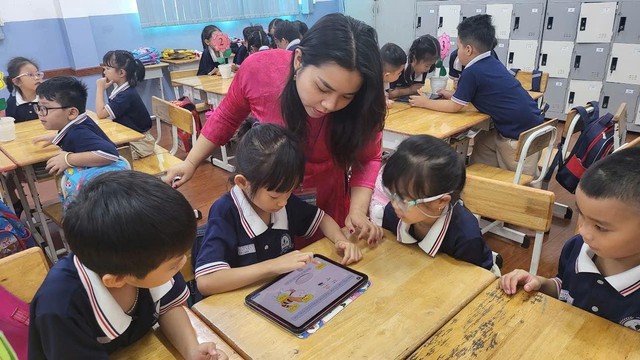
Integrated digital skills education lesson at Phan Van Tri Primary School (District 1, Ho Chi Minh City)
PHOTO: BAO CHAU
In class 1/4 of Phan Van Tri Primary School (District 1, Ho Chi Minh City), teacher Le Thi Kieu Nhi integrates digital civics education into social science subjects with the topics of plants and animals. Accordingly, teachers prepare Elearning lessons, interactive lessons and upload them to the school's digital learning materials warehouse. Students interact with their homework, using tablets and phones with the support and supervision of their parents. Through this, they develop skills to get used to operating computers. After students become familiar with these skills, teachers add lessons using devices to the curriculum.
"Talking about digital citizenship skills to elementary school students, especially first graders, sounds big, but basically for the first grade of elementary school, it's just equipping them with the skills to use a computer mouse, use some basic toolbars to be able to draw, interact, type short answers... For example, social science subjects with the topic of plants and animals, when integrated with digital citizenship education content, students interact on tablets, find animal parts, use artificial intelligence (AI) tools to draw the animal they like," Ms. Nhi shared.
Mr. Le Hong Thai, Principal of Phan Van Tri Primary School, said that the school has integrated digital citizenship education into its curriculum, through integration with subjects from grade 1, to help teachers "get used to it" and at the same time help students initially get acquainted with new content about the concept of digital citizenship skills. Especially, to help parents understand the meaning, purpose, and implementation content of digital citizenship education, thereby having companionship.
At Colette Secondary School (District 3), teachers and students create digital technology lessons by using digital platforms and AI to compose music, design e-books, create videos, and make talking signs... from lessons on planting, caring for, and protecting forests in the 7th grade textbook. From subject knowledge, students will combine with technology skills to build solutions to improve the effectiveness of propaganda and forest protection.
Ms. Duong Thai Tran, technology teacher at Colette Secondary School, in charge of the lesson, said: "The students' products are very diverse, truly digital products, can be shared on many platforms, attracting viewers. The products of music, videos, books, and signs are flexibly applied by the students using digital applications and AI. When given the opportunity to use digital technology, the students are very interested and passionate about learning. The important thing is that they know how to select and evaluate to find the most suitable application...".
According to Ms. Tran, through the digital citizenship skills education lesson, teachers hope to guide students to effectively use digital applications and AI to create useful values. From there, there will be a generation of students who know how to apply digital citizenship skills to create useful products in life.
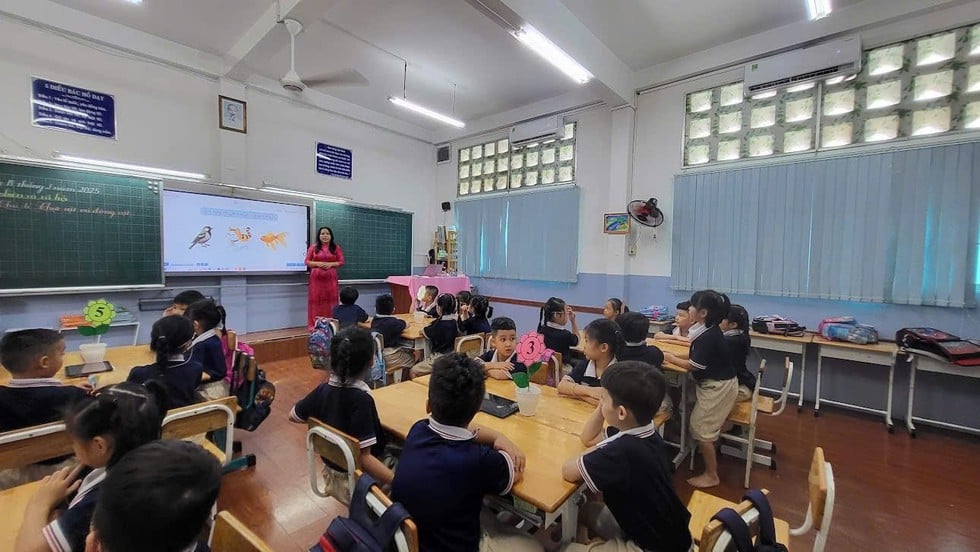
Through the digital citizenship skills education lesson, teachers hope to guide students to effectively use digital applications and AI to create useful values.
Photo: Bao Chau
Teachers also need digital skills.
In order for students to be able to choose suitable AI applications and use technology appropriately and responsibly, according to Ms. Duong Thai Tran, teachers play the role of suggesting, guiding and instructing experiments. To do so, teachers must have digital skills.
Ms. Tran frankly acknowledged that in order not to fall behind in the context of developing digital technology, teachers must always learn and improve their qualifications. For example, they regularly participate in AI training for teachers organized by the Department of Education and Training. This helps teachers gain knowledge, skills, and confidence when applying AI in their lessons as well as supporting students in developing digital skills... The digital products created by students are posted by teachers on the school's digital learning materials page, becoming a useful source of reference materials.
According to Dr. Pham Dang Khoa, Head of the Department of Education and Training of District 3, in the context of technology and AI developing every hour like today, education cannot stand aside but plays an increasingly important role in equipping, orienting and guiding students. Therefore, teachers must become digital teachers, understand the use of AI in teaching and equip students with the ability to use AI effectively in learning... This is the foundation for forming digital citizenship skills for students.
The leaders of the Ho Chi Minh City Department of Education and Training recognized that enhancing digital citizenship skills education in the curriculum is a task of digital transformation in education that Ho Chi Minh City is striving for and is also the goal of the 2018 General Education Program to form the necessary skills for digital citizens.
According to the Department of Education and Training, digital literacy education for primary school students is of particular importance, as this is the age when students are most interested in exploring and using technology. Helping students acquire basic skills in using technology safely and properly will help them avoid online risks and dangers, while developing multidimensional thinking and creative skills necessary in the digital age.
The Ho Chi Minh City Department of Education and Training requires that in practical conditions, schools develop plans to enhance digital citizenship skills education with appropriate content and duration. In particular, special attention should be paid to students in grades 1 and 2, and increased duration and content for students in grades 3, 4, and 5 according to each topic and knowledge stream.
Implement digital transcripts
Implementing the Project "Developing the application of data on population, identification and electronic authentication to serve national digital transformation in the period of 2022-2025, with a vision to 2030" of the Ho Chi Minh City Department of Education and Training, according to the roadmap, in the 2023-2024 school year, Ho Chi Minh City will start piloting digital transcripts for 132,719 first graders. From the 2024-2025 school year, it will continue to be implemented for grade 6, and at the same time, digitize all transcript data of primary and secondary school students. In the 2025-2026 school year, digital transcripts will be implemented in grade 10 and all transcript data of high school students will be digitized.
Accordingly, student data on scores, learning and training results are updated by subject and grade to ensure consistency and integrity of information. After completing the database, the Ho Chi Minh City digital student report data management system is connected to the Ministry of Education and Training's digital student report data management system and the general database of the entire education and training sector.
Digital transcripts have the same legal value as paper transcripts and are used to replace paper transcripts in administrative procedures related to students' learning activities.
If necessary, digital transcripts can be printed out, certified by the educational institution that issued the transcripts, or copied from electronic documents as prescribed, with the same legal value as paper transcripts.
The new point of Ho Chi Minh City when implementing digital report cards is the software to monitor and evaluate students. In particular, for primary school, it is a summary table and evaluation of educational results; for secondary school, it is a student monitoring and evaluation book that has been digitized and stored in a digital environment... This set of data includes data about learners, scores, and learning results. Teachers sign digitally for each class in charge and this data has legal value...
Source: https://thanhnien.vn/hoc-lam-cong-dan-so-tu-lop-1-185250502222622111.htm


![[Photo] Bustling construction at key national traffic construction sites](https://vphoto.vietnam.vn/thumb/1200x675/vietnam/resource/IMAGE/2025/5/2/a99d56a8d6774aeab19bfccd372dc3e9)




![[Photo] Thousands of Buddhists wait to worship Buddha's relics in Binh Chanh district](https://vphoto.vietnam.vn/thumb/1200x675/vietnam/resource/IMAGE/2025/5/3/e25a3fc76a6b41a5ac5ddb93627f4a7a)
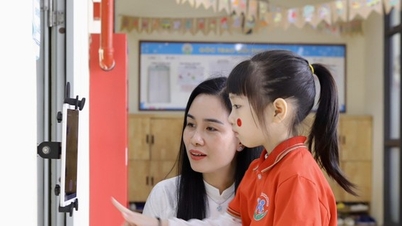

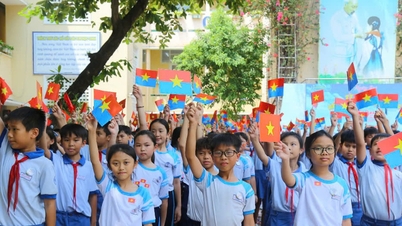
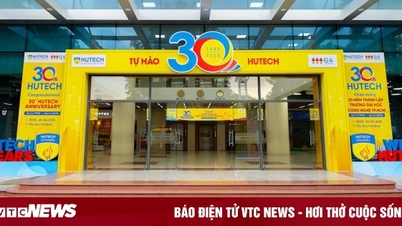













![[Photo] "Lovely" moments on the 30/4 holiday](https://vphoto.vietnam.vn/thumb/1200x675/vietnam/resource/IMAGE/2025/5/1/26d5d698f36b498287397db9e2f9d16c)


































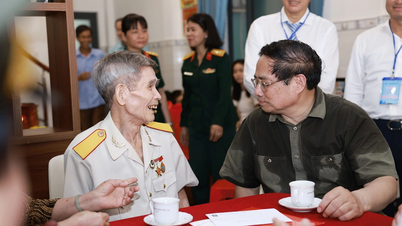

















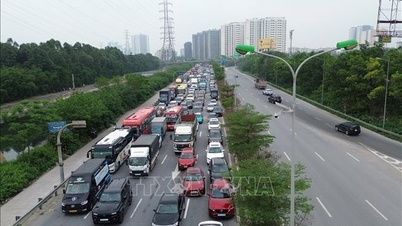












Comment (0)